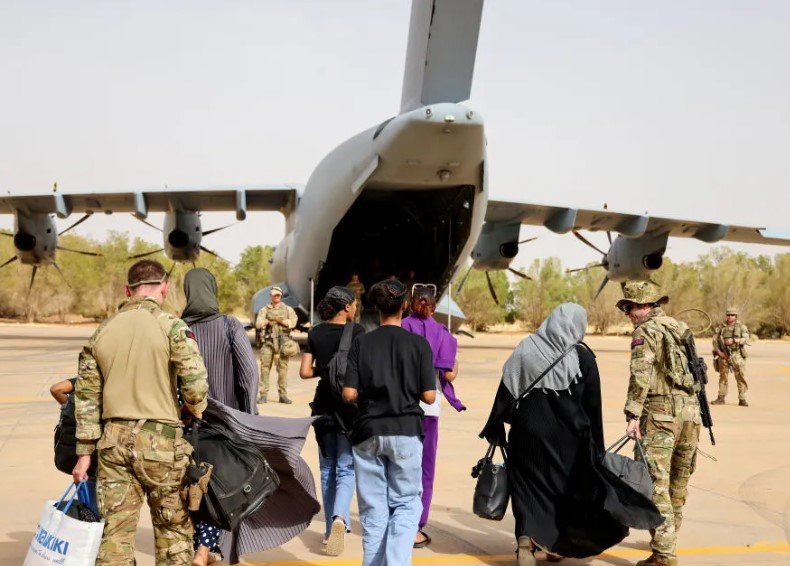Tel Aviv to Cyprus to Home: Britain Moves Fast as Middle East Tensions Bite
A second UK military flight carrying British nationals out of Israel has taken off from Tel Aviv, the Foreign Office confirmed Tuesday, as part of an ongoing evacuation effort amid deepening regional instability and security concerns.
This latest Royal Air Force (RAF) operation flew evacuees to the UK’s military base in Larnaca, Cyprus, from where they’ll continue their journey on a civilian charter to the UK. It’s the second such flight in 48 hours and comes amid growing anxiety over the worsening situation across the region.
Officials said further flights will be arranged depending on demand. British nationals still in Israel or the Palestinian territories have been urged to register their details with the Foreign Office to ensure they can be accounted for—or extracted—if the situation deteriorates further.

Quiet Departures, Loud Questions
The scenes at Ben Gurion Airport were nothing like your average summer rush. No families with sunhats. No school holiday buzz. Just silent tension and fast-checked bags.
Evacuees were escorted through security under RAF oversight before boarding. For many, the relief was visible—but so was the guilt of leaving others behind.
One passenger, speaking anonymously upon landing in Larnaca, said, “It felt strange. Like sneaking out while the house is on fire.”
This was not an official state of war, but the fear felt personal.
A Contingency Plan Activated
The UK government had remained tight-lipped for days, but the accelerated response came after mounting concerns from both citizens and MPs. Over the weekend, foreign nationals had already begun streaming out of Israel as missile warnings and border clashes intensified.
“The Foreign Secretary has made clear: the safety of British citizens is our top priority,” a spokesperson for the Foreign Office said Tuesday.
The logistics behind these flights are complex. The RAF is handling the Tel Aviv-to-Cyprus leg, but once in Larnaca, it’s the civilian contractors who take over. The coordination across military and diplomatic teams, spanning multiple time zones, has been described internally as “tense but effective.”
Still, not everyone is getting out.
Who’s Being Left Behind?
Not every British national is eligible for the flights. And some—especially dual citizens—aren’t leaving by choice.
There’s also concern that non-citizen dependents are falling through the cracks.
“It’s heart-wrenching,” said Sarah Clarkson, a British-Israeli social worker from Haifa. “I know families who had to split because only the British passport holders could board. It’s hard to explain that to a child.”
The UK hasn’t confirmed exact numbers yet. But according to estimates from officials briefed on the operation, over 100 people were evacuated across both flights so far.
A Worsening Security Picture
The need for evacuations didn’t happen in a vacuum.
Fighting between Israel and militant groups in Lebanon and Gaza has escalated. Skirmishes have turned into nightly barrages. The situation has grown increasingly unpredictable since Israel’s deadly strike on Iran-linked targets two weeks ago. That prompted a series of retaliatory warnings—some veiled, others not.
And while there’s been no formal travel ban, Britain’s Foreign Office has strongly advised against all travel to parts of Israel, the West Bank, and Gaza.
-
The travel advisory now warns of “a high risk of missile fire and civil unrest” across multiple regions.
UK intelligence officials remain worried that the broader conflict may expand, drawing in more non-state actors—or even state-backed ones—from across the region.
Flights That Don’t Come Cheap
Despite public pressure, the UK government has not declared the flights free of charge.
Passengers are expected to cover part of the cost of their repatriation, typically pegged to the price of a commercial ticket. But some families are asking why, in such conditions, the government hasn’t waived fees entirely.
“People are scared, stranded, and stressed. You’d think covering the cost of a flight home would be the least they could do,” said Layla Andrews, whose parents are still stuck in Jerusalem waiting for clearance.
A Foreign Office official confirmed that waivers could be considered on a case-by-case basis, particularly for those unable to afford immediate travel.
More Flights on the Table—But No Guarantees
Whether a third or fourth evacuation flight materializes depends on how many more Britons come forward.
The government is reportedly monitoring the situation hour by hour. A team in Larnaca is already on standby. So is a charter aircraft sitting at a UK base, ready to go back if the order comes.
“We’re not ruling anything out. But we need people to come forward,” said one Foreign Office staffer.
Even with planning underway, there’s unease. For many in Israel, Gaza, and the West Bank, the uncertainty isn’t about getting a seat. It’s about how long they’ll have the option.
“Yesterday we had windows,” said one UK-Israeli aid worker, “Today we have blindfolds.”
A Region on Edge and a Government Under Pressure
Back in London, opposition MPs are beginning to raise the alarm—not only about the slow pace of the first flight, but the lack of clarity for dual nationals, dependents, and those unable to self-transport to Tel Aviv.
Foreign Secretary James Cleverly faced pointed questions in Parliament on Monday. He responded by reiterating the government’s “flexible, evolving response”—a phrase that drew eye-rolls from critics demanding more concrete answers.
Meanwhile, diplomatic staff in the region are stretched thin. Embassies in Tel Aviv and Ramallah are reportedly overwhelmed with calls.
One diplomat, speaking off the record, said: “We’re firefighting. People need information, but all we have is moving targets.”
This isn’t the UK’s first evacuation effort from a crisis zone. But it’s proving one of the more delicate—less because of logistics and more because of optics, politics, and timing.
